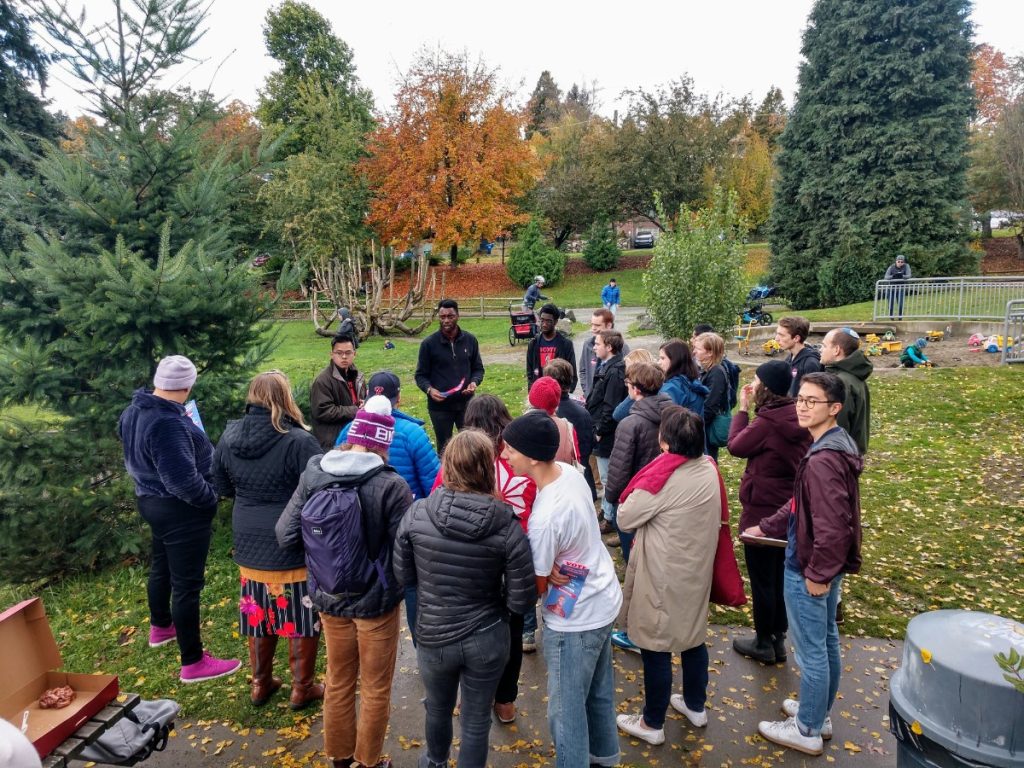
Earlier this month, Shaun Scott was the first to step forward and announce his candidacy for the Washington State House seat in the 43rd Legislative District that will be vacated by 30-year incumbent Representative Frank Chopp. Scott is known for his 2019 Seattle City Council campaign, a race he only narrowly lost to Alex Pedersen in spite of his opponent benefiting from large outside expenditures in the year Amazon spent $1.5 million citywide.
Scott has spent the last four years as the Policy Lead at the Statewide Poverty Action Network. In that role, he lobbied lawmakers to pass the Working Families Tax Credit and the state capital gains tax in addition to co-writing a bill laying out a basic income pilot for Washington State.
“I felt that I could make a difference in this race,” Scott told The Urbanist, “Not just in running a campaign that was going to elevate certain issues, but could make a difference as a sitting lawmaker representing the people of the 43rd legislative district (LD) because of my particular experience in the last four years on behalf of some of the most vulnerable Washingtonians that we have both in our district and beyond… I felt the combination of my experience and the need that I know is felt throughout the 43rd LD with neighborhoods like Capitol Hill and Eastlake renters that really want to see action on affordable housing [and] that want to see action on taxing the rich to pay for the programs that we all use.”
While focused on economic justice, Scott also has experience as a historian, and he wants to bring that perspective to the state legislature, which he says has historically been at its best to the extent it’s taken care of its working people.
When I asked how to get things done in the state legislature, Scott had two lessons he highlighted from his time as a lobbyist in Olympia. First, he emphasized the importance of the connection between lawmakers and their communities, enabling them to be sensitive to what their community needs. He also said we need “lawmakers who are willing to fight as if the bill is going to be implemented tomorrow but have the patience to know it might take six years.”

Scott highlighted that the 43rd is the densest LD in the state and has been a state leader in setting the pace of progressive policy. He spoke fondly of being able to learn from Rep. Chopp, praising his record on passing progressive policies and his knowledge of process and coalition building. While Scott acknowledges some differences between them, he says he doesn’t think the difference is as big as people might think.
“I think our overlap with one another is just around understanding that we need to have a working class perspective and a progressive perspective, a perspective of the everyday Washingtonian centered in the policies that are put forward in Olympia,” Scott said.
Scott’s top policy priorities
When I asked what his top few policy priorities would be during his first term, Scott had four bills he said he’d be eager to begin to push on day one.
The first of these would set into a motion a long COVID policy workgroup to guide and inform state policy in regard to public health.
“Long COVID is a public health emergency,” he said. “The attitudes we have about COVID and long COVID are kind of a test case for just how we’re going to respond to similar public health emergencies in the future. And I think it is a litmus test for how much we actually care about accessibility in Washington State.”
He spoke about being a caretaker for his sister Nicole, who had cerebral palsy and passed away in 2019, and how it is in her memory that he wants to center the experience of disabled Washingtonians in his campaign.
The next two bills he’s interested in championing both involve progressive taxes: closing a loophole on an oil spill tax passed in 2015 that could be used to fund climate projects and working with Rep.April Berg to formulate a real estate excise tax. “Make no mistake, and I want to be clear about this,” he said. “This is a pro-housing position.” The new tax would provide close to $1 billion in funding for nonprofit developers creating workforce housing.
The last bill he mentioned would create a statewide fund for 911 emergency response alternatives. “So many localities under pressure from the movement in the streets in 2020 used the perhaps valid excuse of not having the revenue that they needed to implement the 911 alternatives that they said they agreed with. We want to take that excuse off the table and give cities and counties what they need with respect to establishing 911 alternatives that will save lives for people who call the police because they’re having a behavioral health episode or because they’re in distress and don’t know of other options.”
All four bills are big and impactful swings for a first-time lawmaker to make, but when we discussed his ideas, Scott seemed poised to swing away and fight to make it happen.
Other legislative goals
Scott said he was disappointed to see several housing bills fail in this past session, including the rent stabilization bill, the transit-oriented development bill, and the housing accountability act – all three bills that he supports. He spoke particularly strongly in favor of the rent stabilization bill, citing the fact that 72% of the residents in the 43rd district are renters, and said he expected robust discussion in his caucus about the nuts and bolts of these bills going forward.
He also expects a Golden Age of Transportation in Washington within the next 10 to 15 years, citing the new light rail stations in the Puget Sound area and the Climate Commitment Act. He spoke about the importance of making transit stations accessible and Americans with Disabilities Act (ADA) compliant and making sure we have the funding we need to dramatically expand transportation projects in general.

In the public safety space, he supports Senator Jesse Salomon’s bill about officer discipline that would remove police accountability issues from the bargaining table, instead setting a state-wide expectation of what proper accountability standards should be. And he’s interested in exploring the idea of a statewide cop accountability board, saying, “We seem further from the question of police accountability now than we did in 1994 when a lot of those [accountability] bureaus were first created.”
Unsurprisingly given his involvement writing the language of the recent basic income pilot bill, he’s a huge proponent of guaranteed basic income (GBI) as an additive form of cash assistance for Washington’s most vulnerable. He said Washington would be trailing on initiating a GBI program compared to other jurisdictions.
“The experience of living through and alongside a mass disabling event like COVID has to initiate a paradigm shift for state lawmakers,” Scott said. “The fact [is] that we’ll have so many people who are going to be experiencing major life transitions that make it so that they, for whatever reason, are going to have to fall out of the formal workforce, be it as pregnant people, as people who experience a loss of a job or wages as a result maybe of getting sick. State lawmakers have to be keeping tabs on that kind of a shift and the economic footprint that…is going to have when you have that many economically vulnerable people without disposable income.”
Addressing the climate crisis is one of four policy areas Scott emphasizes in his platform, with particular support for green jobs and organized labor.
“There’s gonna be no way of addressing the climate crisis through… the paradigm of individualism, which has gotten us into it, the notion that you as an individual breadwinner with your family can live in an isolated part of the state and consume and consume and consume without a care for the consequence,’ Scott said “I think we’ve seen the moral cost of that vision, which was for all intents and purposes, state and federal policy for the better part of the 20th century. If we’re seeing the pitfalls of a society that is centered around an individualistic vision for what it means to succeed, the corrective for that has to be collective.”
It makes for a natural pairing with organized labor in Scott’s eyes.
“So programs that center organized labor in specific are ones that I think are going to play a major role in getting us out of or at least slowing the tide of the climate crisis. Climate projects that we care about in the state – affordable housing, the expansion of wind and solar energy projects in the state of Washington, fighting the fires that rage in our forests – all of those are going to have to be done in coalition with organized labor and with a healthy respect for working people that are going to be the reason why Washington sets the standard for far-reaching climate policy..”
In terms of public education, he cited the many working families who live in his district and said it’s an embarrassment that the free meals program is not the law of the land in Washington State. He would like to see us start with the basics.
“The cap on special education funding is regressive and is hurting a lot of kids and a lot of parents,” Scott said. “We talked about funding free meals. We want to make sure that teachers in Washington state schools have the actual right to teach history, so supporting bills that would ban that rollback or combat some of the book ban bills that we’ve seen>”
Inequitably funded, increasingly militarized schools is another issue he wanted to tackle.
“Getting counselors and not cops in schools was a concern that many students had […] elevated as well,” Scott added. “We have a regionalization kind of scheme where you have a lot of districts that are doing really well because they’re affluent and a lot of districts that are doing poorly because they’re poor, and that’s something that we should stop. And hopefully when we get to the point where people start to feel generally better about schools as a result of making those fixes, we get used to the idea of investing in public education, which is something we’ve been divesting from year by year by year of late.”
A positive vision
Scott spoke optimistically of the opportunity to achieve real progressive wins at the state level, and he is grounded in his study of history, both when it comes to understanding the needs of his district and the functioning of the state legislature. He mentioned a problem in Representative Chopp’s mid-career tenure after he’d done a lot of work to grow the Democratic caucus but faced the problem of less cohesion in the larger majorities he had helped win.
He explained it to me as follows: “Suddenly, frankly, you have a lot of Democrats that are doing the work of a lot of Republicans for Republicans, and that has to be named. That’s something we have to understand, that it can be an impediment. And so I think the next rep from this seat can play a real role in setting the pace for what we need to stand for as a party and as a movement when we’re actually in the House.”
The driving force behind Scott’s campaign is the idea that Washington State has everything it needs to fund the programs Washingtonians need and can benefit from.
“We have everything we need to take care of the working class in Washington State, to advance labor rights,” Scott said. “Everything that we need here to make transit, public roadways, institutions we all use more accessible. We have everything that we need to be a more inclusive state that actually funds special education, that protects the rights of LGBTQIA plus Washingtonians…. We have all the brainpower and certainly all the wealth that we need to be the truly progressive state that I think that many think of Washington State as.”
Amy Sundberg is the publisher of Notes from the Emerald City, a weekly newsletter on Seattle politics and policy with a particular focus on public safety, police accountability, and the criminal legal system. She also writes science fiction, fantasy, and horror novels. She is particularly fond of Seattle’s parks, where she can often be found walking her little dog.

